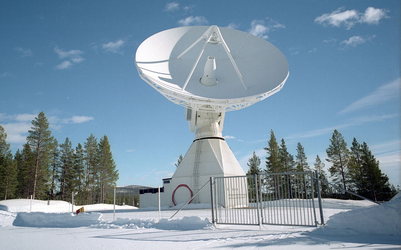SMOS Mission Manager: interview with Susanne Mecklenburg
Susanne Mecklenburg joined ESA two years ago to take up the position of SMOS Mission Manager.

Before joining ESA, Mecklenburg worked in the UK with the British National Space Centre and served as a UK delegate to ESA's Data Operations Scientific and Technical Advisory Group (DOSTAG) before becoming the chairperson.
Mecklenburg received a Masters degree in Hydrology from the Technical University of Dresden, Germany, and a PhD in Atmospheric Science from the Swiss Federal Institute of Technology, in Zurich, Switzerland.
ESA: What does being the SMOS Mission Manager involve?
Susanne Mecklenburg
Since I became the SMOS Mission Manager in June 2007 I have been responsible for all aspects of the mission in the operations phase. This means I will take care of the smooth running of the mission after launch and the subsequent commissioning phase and, most importantly, of the scientific exploitation of the data. We are now in the final stages of the development phase, which is led by my colleague Achim Hahne at ESA-ESTEC. He has been taking care of building the mission since SMOS was selected as the second Earth Explorer Opportunity Mission in 1999.
At the moment I am busy planning the operations phase, which comprises all scientific, technical and financial aspects of the mission. We now have all the ESA internal and industrial teams in place that will support the SMOS operations. The main activities at the moment focus on preparing for the SMOS commissioning phase, which will last six months after launch. This time will be dedicated to the calibration and validation activities, which are a major undertaking in any environmental science satellite mission. Once the data get to the ground they need to be checked in terms of whether they make sense and can be used for scientific research.
ESA: What is your involvement over the lifetime of the satellite?
Susanne Mecklenburg
I will be involved in making sure the satellite operations run smoothly and the data are being used by scientists and interested operational agencies. I expect the latter aspect to become more dominant the more data we have available, which will open many interesting scientific opportunities.
ESA: Who will be the main users of SMOS data and how will data be delivered to them?
Susanne Mecklenburg
There are two main groups of users. Scientists, such as oceanographers, hydrologists and atmospheric physicists will use the global measurements for their research projects. We already have a significant number of registered users who will receive data directly from the Data Processing Ground Segment at ESA’s European Space Astronomy Centre (ESAC), in Villafranca, Spain, or from the archive in Kiruna.
The other group of users, including the European Centre for Medium-Range Weather Forecasts (ECMWF) and national meteorological services, will focus more on operational applications. They have requested to receive SMOS measurements within three hours of acquisition to assimilate the data into their forecasting models. ESA has responded to this need by establishing a near-real time service by funding a further ground station at Svalbard that will receive SMOS data more frequently than the ESAC station at Villafranca. ECMWF and MétéoFrance in particular are already working on integrating these data into their predictive models, testing the improvements SMOS data will be able to make to meteorological forecasts.
ESA: Where will you be for launch?
Susanne Mecklenburg
We are still finalising the detailed programme for the SMOS launch event, but I expect to be at ESA’s Earth Observation Centre (ESRIN) in Italy on the day of the launch. The launch will be very early in the day, so we have decided to organise a prelaunch event at the end of October to brief the international press.
Editor's note:
This is one in a series of interviews with a few of the key people involved in the SMOS mission. Please check back, as the list will be added to over the coming weeks.















 Germany
Germany
 Austria
Austria
 Belgium
Belgium
 Denmark
Denmark
 Spain
Spain
 Estonia
Estonia
 Finland
Finland
 France
France
 Greece
Greece
 Hungary
Hungary
 Ireland
Ireland
 Italy
Italy
 Luxembourg
Luxembourg
 Norway
Norway
 The Netherlands
The Netherlands
 Poland
Poland
 Portugal
Portugal
 Czechia
Czechia
 Romania
Romania
 United Kingdom
United Kingdom
 Slovenia
Slovenia
 Sweden
Sweden
 Switzerland
Switzerland



























